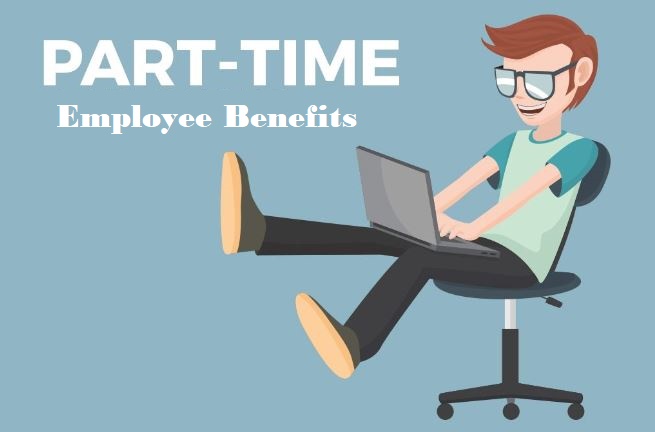Part-time employee benefits, also known as perks or fringe benefits, are provided to employees over and above salaries and wages.
These Part-time employee benefits packages may include overtime, medical insurance, vacation, profit sharing, and retirement benefits, to name just a few.
What are part-time benefits?
Part-time benefits are often the same as those offered to full-time employees that they earn by working fewer hours. Companies typically reserve common benefits like health and dental insurance and retirement funding for full-time employees. However, you may still choose to offer some or all of these to part-time employees.
Offering Part-Time Employee Benefits
How Part-Time Employees View Benefits . Part-time employees most often view benefits as valuable perks, especially if they are working other jobs and cannotafford to purchase insurance through other means. They have the same, if not more responsibilities than full-time employees, often juggling raising a family or going to school with that of a job.
Everything you need to know about part-time employee benefits
Generations of people think that flexibility is a must at work. They’re seeking jobs that offer flexible hours, or that have locations that allow for time, work-life balance and benefits pay, culture, and benefits.
This could be the reason why part-time work is growing, and the number of part-time employees across the U.S. increased by over 1 million in 2022. The majority of these workers work at least 20 to 35 hours per week, giving them time to spend with families, school, or personal growth..
Full-time employees typically get advantages from employers, however the specifics of benefits for part-time workers can be somewhat hazy. The rules aren’t always as rigid which means that things such as healthcare, scheduling and taxes are dependent on the agreement between you and your employer. agreement.
It is important to pay close pay attention to your employer’s partial-time employer benefits policies. You deserve perks even if you’re part-time.
Learn more about the different types of employee benefits offered and how they work for employees who work part-time.
What are part-time employee benefits?
Part-time employee benefits differ between employers and for full-time or part-time benefits. They generally offer the same benefits offered to full-time jobs, including retirement insurance, life insurance, paid sick leave, as well as healthcare.
There is no regulation of part-time employment under the Fair Labor Standards Act (FLSA) doesn’t consider part-time work differently than full-time employment.. However, the majority of employee benefits such as the severance or vacation pay or breaks during work, aren’t FLSA controlled.
It’s the responsibility of the employers and employees to reach an agreement. In most cases full-time employees enjoy greater benefits than those who work part-time.
For instance For instance, it was reported that the Bureau of Labor Statistics reported that by 2022, health benefits would be provided to the 88% of full-time workers, however just 23% of part-time workers. In the same report, the retirement benefit was accessible to the 81% of full-time employees, and 43% of part-time employees..
Benefits that are required differ from state to state. Review the policy of your state to determine whether you’re entitled to benefits over and above what your company offers.
The provision of equal benefits for part-time workers is the responsibility of the employer. And even though it’s not widely practiced however, it’s not impossible to find. Finding the ideal job with benefits that are in line with your needs is more than feasible.
Customary part-time benefits
Part-time employees may receive benefits that are beyond what is legally legal. It’s all up to the employer you work for.
Even though benefits for part-time workers tend to be less extensive than those for full-time employees, these are some benefits that employers’ benefits plan could offer:
Health insurance
The annual average healthcare insurance cost for the U.S. was $7,911 in 2022 which is only for individuals. Healthcare costs are a substantial cost for the average family which makes them one of the most essential benefits in any benefits package for employees. Different types of insurance could be provided, such as:
- Medical insurance: typically will cover visits to the hospital or doctor prescriptions, as well as annual examinations
- Dental insurance: usually covers examinations and cleanings, extractions, and repairs, but not cosmetic procedures such as tooth whitening
- Vision insurance: typically covers examinations prescription glasses, eye exams, or contact lenses, as well as surgical procedures like laser eye surgeries or cataract surgery.
Your healthcare coverage will be less dependent on the amount days you’re working, and much more upon the size your business. As per the Affordable Health Care Act of 2010, smaller businesses that employ less than fifty full-time workers aren’t required to provide healthcare benefits..
Large employers that are eligible (ALEs) are required to provide medical benefits, but only to full-time workers. Larger firms have a greater amount of resources, and they’re more likely to offer benefits to employees who work part-time.
If your employer doesn’t provide health insurance for part-time employees take into consideration the cost of purchasing one yourself in negotiations for your pay as well as benefits.
Tuition assistance
A lot of larger corporations invest in their employees’ advancement in their academics, such as providing tuition assistance for college or programs for certification, however it’s not a common perk. Employers might also offer reimbursement programs in which they reimburse you for tuition either directly via a loan company.
Professional development budget
In addition to traditional schooling options Companies may offer development opportunities, including career coaches, conferences or even one-off classes. The company benefits equally as you do and is a good argument for negotiations on an employee benefits package.
Paid time off (PTO)
One of the biggest stresses for freelancers and part-timer isn’t simply seeking time off but also receiving a salary for it.
In many instances — particularly for jobs that pay hourlyin the event that you aren’t working or work, you’re not compensated. If an employer offers part-time workers only limited or unlimited PTO (or any time at all) it will be specified in specific details on the contracts.
Retirement plan
Retirement plans are an income source following you have left the workforce.
The United States, retirement plans generally 401(k)s that let you can set aside a certain percentage of your earnings to be immediately taken out of each paycheque. Certain employers offer 401(k) match and other benefits that assist you in saving money to be looking for retirement.
Employee stock options (ESOs)
Larger employers and startups typically offer stock options to employees that can be as actual stock or the option to purchase stocks at a reduced cost. Employers could give these to all employees or to top performers.
Even if it isn’t your intention to commit your entire time to the business, purchasing the company’s stock shows your commitment and long-term interest. If the business succeeds then so does the employee.
Overtime pay
Your time is crucial and that’s probably the reason you’ve decided to take a part-time job, at first. When your schedule goes beyond scheduled hours, employers may pay you accordingly.
If you are employed on an hourly basis or more, you could be charged 1.5 up to two times the amount of the regular salary. If you are working on a project-based basis, make sure you include a charge in your contract that covers any other items that are not within the area of the contract.
Benefits of a part-time job
Part-time jobs are all about priorities and at times, you must opt for flexibility over more extensive advantages. There are other benefits for part-time work:
1. Space for new job opportunities
Part-time positions are great for consultants and creative types who like mixing things up with clients and projects that are new. A 20-hour week of work is a good option, which gives the opportunity to focus on different projects.
Aspired fashion photographer could be employed as a part-time employee at an advertising agency and create an portfolio while working or a writer may engage in marketing in order to finance an idea for a book.
If you are employed full-time working an extra hour somewhere could give you some space in the event that the work stability decreases.
2. Help with a career transition
If you’re in the middle of a job search or preparing to change your career direction, financial stress could influence your choice.
If you’re looking to begin on a new career path working part-time offers you the assurance of a regular income and gives you the time to find the perfect full-time job. Part-time jobs can also give you experience in the sector without the need for a full commitment.
3. Reduced stress
The typical American worker is working 34 hours per week, as of December 2022 which includes part-time workers. However, constant connectivity to email messages, messaging platforms, and workflow applications could make it seem like longer. Those who work more than 40 hours often lack the energy to handle personal obligations.
Part-time workers are able to enjoy more time to make a balance between work, home and personal interests, which can reduce stress and keep their energy levels in check..
4. More independence with your time
Your time is your most important asset, and it’s one of the biggest advantages of a part-time job.
A lot of part-time jobs let the flexibility to schedule your day with greater flexibility. You’ll not only be spending less time in the office as a part-time worker, but you’re also not restricted to working a 9-to-5. It is possible to adjust your schedule to suit your personal schedule, for example, working in the in the mornings when you are more energy.
A lot of part-time employees make use of their flexibility to take care of child care, private projects as well as physical and mental wellness.
The time you spend with your family is a crucial aspect of mental health. The ability to have an adequate amount of time each day can dramatically reduce stress. Spend your time on your professional and personal growth for example, doing yoga or engaging in a creative activity, learning new skills or returning to the school you attended.
Conclusion
Benefits for employees who work part-time are an important aspect of every job. They provide benefits and support for those who have a non-full-time working schedule. While the exact benefits offered differ, it’s important that part-time employees understand their rights and entitlements.
When contemplating a part-time job, you must inquire about the benefits plan to negotiate terms and conditions that match with your goals and needs. If you have the right information and ability to negotiate, part-time work is satisfying financially and emotionally.
👉 You can read more articles like these on my website: employeebenefit.onl
part-time employee benefits:FAQs
What is hire part-time employee?
A full-time worker is one who has to work between 35 and 45 hours each week, with the average being 40 hours. On the other hand, a part-time employee is one who is working less than. So, the person you are looking to employ can be employed between one up to 39 hours.
What are the types of part time employment?
They are entitled to with full-time employees the exact same rights and responsibilities. In addition, they work shorter hours than full-time employees do. They may work shifts that are irregular or regularly on certain days of the week, such as part-time nurses or shop workers.
Why do part-time employees not get benefits?
There is no true “cause” for this other than the absence of laws, unions, and practises that encourage healthy competition. It is untrue that “no one gives benefits for part-time employees,” as this statement implies. There are some firms who do provide some benefits to part-time employees, but these benefits are typically scaled back.
How many hours a day is a part-time?
That categorises as part-time employment everyone working between 1 and 34 hours per week, and full-time employment for anyone working 35 hours or more per week. Statistics from the Current Population Survey (CPS) that were published by the BLS were used to calculate these numbers.
Is it better to work part-time?
People who work part-time jobs have more time on their hands, which they can use to pursue interests outside of work. Not only may those who work part-time save money on the costs of gas and automobile maintenance, but it’s possible that they could also save money on the monthly premiums that they pay for auto insurance.
Do part-time employees get retirement?
The “1,000-hour rule” is a provision of the Employee Retirement Income Security Act (ERISA) that dictates qualifying requirements for part-time workers who wish to participate in the retirement plan of their employer. Those workers who have put in a total of one thousand hours of service over the course of a year are entitled to join in any retirement plan that is made available to other…
Are part-time employees entitled to have similar rights to full-time employees?
Part-time employees have certain rights as full-time employees for example, minimum wages, overtime pay and other benefits, based on the policy of the company as well as local laws.
What are the conditions for employees who work part-time?
Are they entitled to healthcare benefits? Certain employers offer health insurance for part-time employees, however it’s not always the case. In most cases, eligibility is contingent on the amount of time employed and the policies of the company.
Do part-time employees take part with retirement plan benefits?
Yes, certain employers offer retirement plan options to employees who are part-time. Make sure you inquire with your employer about the eligibility requirements.
What is the procedure for paying time off (PTO) apply to employees who work part-time?
PTO for employees who work part-time is usually calculated based on the amount of hours they work. The exact rate of accrual and policy of the company can vary.
What should I think about when I am negotiating a part-time job?
If you’re negotiating a part-time employment talk about benefits such as hourly rates, scheduling flexibility, as well as any possible possibilities for advancement in your career.
What happens when part-time employees change to full-time jobs within the same organization?
It’s usually possible for part-time workers to switch to full-time jobs within their workplace. Be sure to mention your interest in these opportunities to your boss.
People Also Searches part-time employee benefits
| health benefits for part-time employees | benefits of part-time employees to a business |
| do part-time employees get pto | do part-time employees get holiday pay |
| 1,000 hour rule for part-time employees | do part-time employees get insurance |
| full-time employee benefits required by law | Part-time employee benefits |


